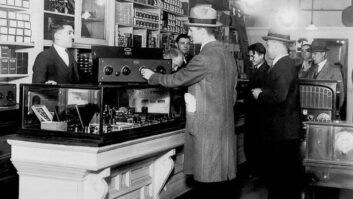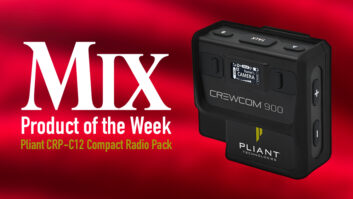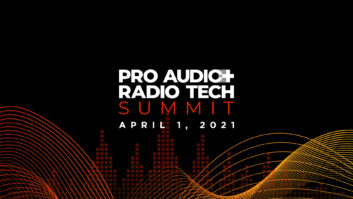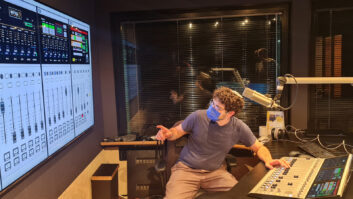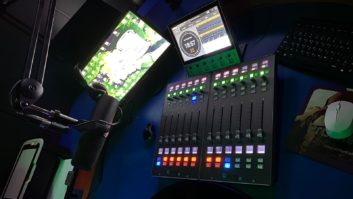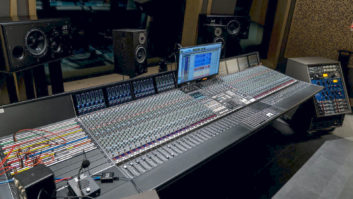
I was born and raised in Memphis, where some of the most importantAmerican music of the 20th century was produced. From my perspective,artists such as Elvis Presley, Carl Perkins, Johnny Cash, Roy Orbison,Charlie Rich, Jerry Lee Lewis, Sam & Dave, Rufus Thomas and manyothers would’ve never had a shot at national popularity if they werenot broken first on regional radio. This is music that helped changethe world as we know it, and it was radio that got the word out.
Regional music also came out of New Orleans, Chicago, Detroit,Austin, Boston, San Francisco and other cities — making theirmusical marks with the help of DJs and music directors who operatedfrom their own instinctive passion. During the late ’60s to mid-’70s,album rock radio helped popularize the FM dial and became a voice for awhole generation of rock fans, who turned to it daily to keep a pulseon what was happening on the street. Radio was vital. But it was alsobecoming a big business.
In the late ’70s, radio began to look like an even better buy forinvestors and large companies, and soon, radio’s spirit seemed tosuffocate under the crush of tight programming, interchangeable DJs andself-amused “morning crews.” On the music industry side,record labels enlisted armies of promotional hit men who requiredfortunes to deliver playlist ads for new music releases at reportingstations. Many radio program and music directors, already underpressure to deliver on an ever-rising bottom line to the corporateparent, turned to a handful of people who marketed themselves asconsultants.
One of radio’s legendary consulting pioneers is Lee Abrams. In 1993,Newsweek listed Abrams as one of America’s “100 CulturalElite” for his contributions in creating modern radio’s feel;Radio Ink listed him as one of the 75 most important radiofigures of all time.
“Research was once part of an art/science balance but ended upruining radio, as more stations focused on Wall Street instead of MainStreet,” says Abrams. “Local radio has been dead for 20years. It’s the same playlists, the same voices, the same production,same slogans — same sound everywhere. Stations used to havedistinct local sounds and actually get into the community, with theexception of big AM MOR stations. Now, it’s all efficient cookie-cutterradio that sounds the same in Utah as it does in Miami.”
While it is easy to blame the consultants for the current radioblandness, the real culprits are the radio station owners andprogrammers, most of whom lack the courage to either follow theirinstincts or listen to their audience. And, of course, the majorinfluence on the way radio sounds is money, not musical quality.
In an April 3, 2003, Nashville Scene feature about payolaentitled “Cash Cowed,” Epic/Monument Nashville senior VP ofpromotion, Larry Pareigis, said, “It costs about $300,000 to geta record generally to around 25 or 30 [on the charts], to see if iteven has legs. It’s an expensive proposition.” Another promotionperson in the article stated that “the rule of thumb was that itcosts a label $100,000 to get one of its singles to move 10 spaces upthe country charts.” Even if some of this expense is not,strictly speaking, illegal payola — pay to play — it isstill part of a corrupt system involving dubious promotional financing,favoritism based on economic leverage and a network of elaboraterewards and kickbacks.
Another industry insider told me, “Radio and the record labelsput the ring in their noses and they allowed themselves to be led on.When I hear them whining now, I don’t have any sympathy. They createdthis, and this is a bed they will have to lie in for awhile.”
At the corporate level, the biggest change affecting commercialradio has been the deregulation by Congress and its enforcement agency,the Federal Communications Commission. The Telecommunications Act of1996 removed the cap on the number of radio stations any one companycould own nationwide, and for the first time allowed one company to ownand operate multiple stations in a single market. Michael Powell(Secretary of State Colin Powell’s son), the new head of the FCC, hasmade it clear that he is in favor of further deregulation. We now livein a radio world dominated by Clear Channel (which owns 1,238 stationsnationwide and rising) and Infinity, where “branding” canmake the “classic rock” station in one city sound an awfullot like the one in 10 other cities.
There are alternatives to the same ol’ radio blues. But they’re notlikely to come from terrestrial broadcast. And they’re not likely to befree.
SATELLITE DELIVERY
These days, Abrams has his mind on the future of radio as a premiummusic, audio entertainment and information service delivered viasatellite and the Internet. As the senior VP and chief programmingofficer for Washington, D.C.-based XM Satellite Radio, Abrams believesthat enough of the public is so sick of bad radio that once people hearXM’s offerings, they will drop $200 or more for the receivers and $9.99a month for 100 channels of music, news, talk, sports andentertainment.
Larry Rebich, VP of programming and market development for the othermajor satellite service, New York-based Sirius, shares Abrams’enthusiasm. “With the absence of having to be concerned withadvertising support on those music channels, we are free ofconventional music-programming practices,” says Rebich.“The emphasis is on music experts and knowledge of the music. Ourstream designers — as we call them here — aremusicologists, journalists, musicians and people who haveradio-programming backgrounds.”
Both Sirius and XM are designed to be more than just“radio,” but rather premium programming alternatives,similar to HBO or Showtime. The question is, can a public that is usedto free radio be convinced to pay for it? Market studies conducted forXM optimistically project that as many as 49 million people willsubscribe to satellite radio by 2012. To reach that kind of number,satellite services will have to greatly increase public awareness,especially among drivers.
The automobile is one of the primary places people listen to musicand hear news. Both XM and Sirius have secured agreements from automanufacturers to offer receivers. Most recently, Hertz closed a dealthat provides consumers with the opportunity to experience Sirius whileusing their rental cars at more than 33 major airport locations,beginning in July.
“We have great support from GM, Daimler-Chrysler, Ford andBMW, and once these things are available in every new car, it is agiven that this will happen,” says Rebich. “It is fiveyears out at the very most. XM will reach a million subscribers thisyear, which is very good. I am completely sold that this idea is goingto work, but it won’t happen overnight.”
In the spirit of trying to personalize the listening experience,both XM and Sirius have made it possible for people to contact DJs andprogrammers with feedback and requests. “Our customers are payingus directly for the entertainment experience that we’re delivering tothem,” Rebich notes. “So it’s really important for us tomaintain customer satisfaction.”
And they are also trying to do right by the artists. On March 19,2003, XM and Sirius reached a royalty agreement with the music industryto pay for music delivered over the services. “The royalties paidunder this agreement will be an important new revenue stream for the3,000 labels and thousands of artists we represent,”SoundExchange executive director John Simson told The HollywoodReporter.
THE INTERNET
Satellite radio is definitely ramping up and making its push in themarketplace; but for a few years now, there has been another option:the Internet. Who hasn’t tuned in to a conventional station such as NPRwhile at work or, better yet, listened to a favorite program on theirown schedule, not the station’s? Lately, there has been a rise in musicservices such as Nullsoft’s ShoutCast, Live365.com and Yahoo’sLAUNCHcast Plus, which provide users with access to thousands of musicchannels, allowing them to create their own “stations.” Tolisten, all a user has to do is sign on and start checking out theofferings. The sound on these sites isn’t as high as satellite,generally streaming at 56k MP3 and offering 128k MP3 for more premiumservices. While a large percentage of the “channels” areamateurs that share streams of as many as 200 songs, there are signsthat there is a lot of passion for music out there.
“It is funny you mention giving the radio back to the people,because that is exactly what we are in the business of doing,”remarks Raghav “Rags” Gupta, COO of Live365.com, whichoffers more than 15,000 stations on its site. “The best way tothink about us is as the eBay of Internet radio: We provide people withthe tools and server space and the infrastructure and the bandwidth andso forth, and they come on and create radio stations on our site andpromote it. We’ve got churches streaming sermons on our site, sportsteams doing games — that is what the Internet isabout.”
With the evolution of GPS and wireless Internet availability forcars and cell phones, I asked the two satellite providers,“What’s keeping free Internet radio from landing in your car andserving you on the go?” Abrams says, “Nothing, but it’s allabout the best content, which is why XM is waging a content war: FM,Internet, satellite or whatever.”
Gupta notes, “That is the promised land of Internet radio. Oneday, when you look out there and all the cars and these other devicescan get the Internet, then it is a matter of getting them a DSP. Boom,you basically are able to play Internet radio, whether it is files youdownload or stream, which is probably the more likelyconsumption.”
As people continue to find new ways to be entertained and informed,the line between the audience and creator will continue to blur, andmaybe we will get our own radio.
“We believe that the Internet IP connectivity is going to getout to mobile environments and other devices, at which point, it reallybecomes just like radio,” Gupta says. “You’re going to havejust another band on your device. Philips Electronics already has acouple of Internet radio devices out there on the market, like aboombox [that has] an Internet jack. In the future, you could bedriving around in your car listening to your own station.”
Rick Clark is Mix‘s Nashville editor.
Give UsOur Radio Back!
Read an essay by legendary radio DJ Redbeard
